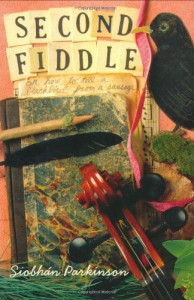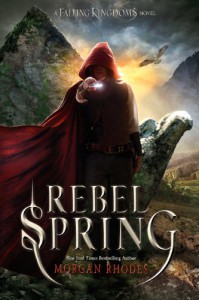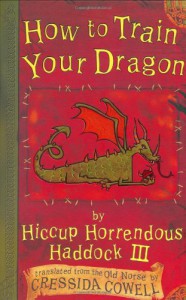
4 1/2 stars.
I received this book from the author in exchange for an honest review.
When I first started reading this book I was thinking I'd give it 3 or 3 1/2 stars. To my surprise, by the time I finished it I'd become so invested that I feel it deserves a solid 4 1/2 stars.
I loved the character development from both Alex and Rob. Alex started as a timid boy who was overcome with guilt for something stupid he did as a child that had longstanding repercussions for himself and his family, and over the course of the book , it seemed like he finally forgave himself, and allowed himself to move on. There was never a point in the book where he put that into words, which might have been nice, but it worked this way too because it worked with Alex's personality. Rob was somewhat selfish in the beginning of the book. He spent a lot of time in front of the television, and he didn't seem terribly disciplined. Training for STP helped him fix his discipline problems, and realizing that his reasons for not letting Alex ride with him were mostly selfish helped him to become more selfless.
Plot wise the book was pretty solid. The STP section was fairly short, but I think the climax of the story was Alex's quest to ride STP, so his training, and Rob overcoming his reservations about letting Alex ride. There were only a few places that I have to comment on. The first is that, somehow, I got it in my head that Alex's accident and Rob's reason for hanging up his bike were related. I'm not sure if that was my fault or if it was implied somewhere in the book. I wouldn't have minded more details about why Meg and Rob couldn't have more kids, but (I think) this book was written so that 10 and up could read it, and details like that might have made it less kid friendly (Hermes's mother's inability to have more kids may have been one of the smallest reasons for Rapunzel Let Down being for older readers, but its affect on Hermes's character was still something that could be upsetting for younger kids.) And finally, I wanted to know if anyone saw the number on the person who caused Alex and Rob's STP crash. One of the other riders asked if anyone saw his number or if he was still there, but that question was never answered.
A lot of the side characters were well developed as well. I really liked the relationship that was set up between Alex and Ronnie, and I found myself wanting to see Ronnie more. I also liked both of the Jacobs, and, though I disliked them, I appreciated the bullies characters, because kids can be really mean. I am somewhat conflicted on Connor. I liked his character at first, but his behavior at the birthday party was quite nasty, and I do think that it might have developed Alex's character more had Connor either not apologized, or otherwise if their friendship had ended. And I liked the fact that he apologized because sometimes we accidently do something mean and feel bad about it later, so it was realistic that he their friendship survived, but I did think it could have developed Alex even more if he had felt abandoned.
I have a few more comments that had little effect on the plot that I still want to bring up. In general when a Veronica goes by a nickname, it's spelled Ronni, not Ronnie. This spelling wasn't terribly distracting, but I think it's worth mentioning. There were a few technically correct, but awkward feeling sentences in the beginning of the book, and one or two grammatically problematic sentences. The only grammar problem that I saw consistently was the dropping of pronouns. I understand that this is how many people talk, including me at times, but seeing it consistently in print bothers me for some reason. At times the words 'cuddling' and 'cuddled' were a bit overused in the chapters where Rob and Meg are talking. I didn't see it at first, but in chapter eleven it was used four times in less than two pages, and after that every time it was used I noticed it. This happens a lot in books, I read one where the word the author overused was 'appendages' of all words (and that book wasn't very good, so it bothered me even more,) and even in The Lord of the Rings I started counting the number of times Legolas or Aragorn 'sprang' somewhere. They never jumped or leaped, they always sprang.
My final negative comments have to do with Alex's music. I am not an organ player, but the descriptions of the organ seemed very accurate from what I do know about the instrument, but I am a music major, and I thought it seemed a bit short for Alex, a eleven to twelve-year-old who was extremely serious about his music to still be having only a half-hour lesson a week. He probably should have had at least a forty-five minute lesson by then. Then again, like I said, I don't play organ, so maybe you don't need as long of lessons for organ as you do for violin and piano. I can't imagine a teacher asking a student to perform for the first time as an accompanist, especially if they were nervous about performing, because if the choir messed up then you have to be able to follow them if they skip or repeat a verse, or if they messed up the tempo. Or if the accompanist messed up then it could completely throw off the choir. I have never liked performing. My first violin teacher forced all of her students to participate in two recitals a year whether we were prepared or not. My second teacher said that we had to be prepared to perform in at least one of her two recitals a year, but she was far more likely to push being prepared than performing. I also found myself frustrated by Rob's comment that Alex needed a sport. The only time I had a sport (ballet) at the same time as music was in the first few years with violin. Just long enough to get the five-year trophy that the dance studio gave out (yeah, I started ballet when I was way too young, but my older sister was doing it so I wanted to dance too,) but it came down to violin or ballet and we chose violin. We had friends who chose ballet, or some who chose Westernaires instead of music. I agree with Rob that Alex needed exercise (this coming from someone who gets out of breath walking a couple of blocks uphill to get from the music building to the church,) and I'm glad that Alex discovered a sport that he loved, but I still found it frustrating that Rob insisted Alex needed a sport.
This is one reason I don't like writing reviews. In my attempt to give authors feedback my reviews always end up sounding negative even when I really enjoyed the book. I used to ride on the trail-a-bike with my dad, although we called it the tag-a-long. This book made me really want to do two things that are quite impractical right now. I want to ride my bike more. I haven't ridden very much for years. I only got a bike that fit me after growing out of my last bike this past summer, and I have too much homework to do much riding now, and I want to write a piece for organ, but I don't think there is anyone at school who plays the organ. I don't think we even have an organ performance program, and I don't understand the organ enough to write a piece for it without talking to someone who plays the organ, especially since Adler's [b: The Study of Orchestration|333298|The Study of Orchestration|Samuel Adler|https://images.gr-assets.com/books/1348391643s/333298.jpg|323829] only has three pages about the organ.
In conclusion, overall I really enjoyed this book, and I think the author has a lot of potential.
 Alexandra is incredible. She was strong, and suffered at the hands of all of her brothers. The story was beautiful, even in it's sadness. The writing was poetic and kept me reading.
Alexandra is incredible. She was strong, and suffered at the hands of all of her brothers. The story was beautiful, even in it's sadness. The writing was poetic and kept me reading.










 5
5





